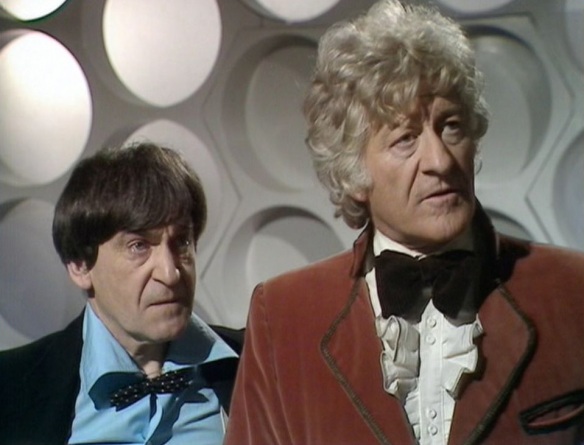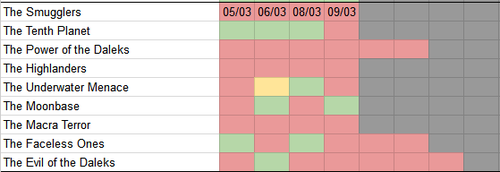
On the 26th October 2014, I fancied watching some classic era Doctor Who. Things kind of got out of hand.
I looked at my shelf, and my eyes were drawn to a couple of boxsets that I’d bought but never watched – The Key To Time and The Trial of a Time Lord. What a novelty it would be, I thought, to watch a full season of the show, rather than just the odd serial. Then I noticed my well-worn The Beginning boxset, and I had an idea. An idea, a blank spreadsheet, the Wikipedia list of Doctor Who episodes and an Amazon wishlist. A project was born.
Three years, four months and fourteen days later, the journey is complete, and the end point couldn’t be more apt. Not only is it the end of an era for both Doctor and showrunner, but we’ve virtually come full circle, with an adventure featuring the First Doctor (along with, all too briefly, Ben and Polly), set within a serial I first watched in March 2015. I loved David Bradley in AAISAT, and so was delighted that he got the chance to do it for real, not least because it means that there’s now an official Doctor who’s an Aston Villa fan.
Former Doctors being extremely grumpy about everything to do with their future selves is a well-established staple for multi-Doctor stories, and the comedy drove the opening stages of this story. Between the complaints about windows being wrong, Bradley describing Capaldi’s TARDIS as being like “some restaurant for the French”, and him threatening to smack Bill’s bottom, Moffat was on very good form for his last hurrah.
The First Doctor’s casual sexism stirred some furious debate at Christmas time. To those who feel that it was unfair to the First Doctor’s reputation – or indeed that of Classic Who – I’d suggest they go back and actually watch some. There were all kinds of now-unsavoury attitudes on display in the black and white days, but you can see past this because the episodes are a product of their time, and there are plenty of more progressive ideas in evidence, both in front of and behind the cameras. Moffat knows this, so there’s nothing wrong with having a bit of playful fun with it fifty years later.
It was quite a bold move to end an era with no real villain and no evil plot to thwart. The reveal of Rusty in the tower was somewhat underwhelming – if I hadn’t had rewatched his episode a month earlier, I doubt I’d have remembered who he was. But it feels kind of apt that Moffat would choose to eschew so many conventions for his swansong, and the lack of blockbuster action wasn’t really an issue, as the episode is about much more than that.
It’s two stubborn old men – well, one stubborn old man, twice – having to learn something about themselves before they can come to terms with death, or at least the Time Lord equivalent of death. For the First Doctor, he has to realise how much potential he has to be a force for good in the universe, and this is what changes him from the reluctant hero of his first incarnation to the pro-active protagonist he became from Troughton onwards. It takes a demonstration of the Twelfth Doctor’s ingenuity and mercy for him to see it, during which I myself learned that the mere mention of the name “Lethbridge-Stewart” is enough to make me cry. Those Christmas Day truce scenes were truly emotional.
As for the Twelfth Doctor, it takes a combination of Bill, Nardole and Clara to convince him to carry on, with the ex-companion cameos now seemingly a tradition for regeneration stories. It’s a shame that Jenna Coleman’s availability kept her and Capaldi apart, but the one final cuddle between him, Bill and Nardole was just lovely. Then one of Doctor Who‘s greatest ever writers signs off with a beautiful speech for one of Doctor Who‘s greatest ever lead actors. I feel like neither will be truly appreciated until they’re gone, but both of them have done so much to take the show into new and original directions, which is no mean feat after such a long life.
I’ve been worried about the Moffat-less future ever since his successor was announced. But one perfect piece of casting goes a long way to improving expectations, and I have to say that the final minute of this episode was a pretty amazing teaser for what’s to come. I wasn’t expecting such a dramatic cliffhanger – normally the Doctor having a new face is enough, especially as this face is so different to the ones that came before. I am unequivocally delighted that Jodie Whittaker is the Doctor, and I absolutely can’t wait to see more. “Aw, brilliant!” indeed.
RATING: 10
Well now. Let’s just have a quick check of the progress counter:
- Seasons/Series watched: 36 of 36
- Stories watched: 276 of 276
- Individual episodes watched: 840 of 840
I’ve done it. I’ve watched every episode ever of Doctor Who – plus all the specials and spin-offs – in order, not quite a day at a time. It’s taken me longer than anticipated; it wasn’t possible to keep up the daily pace during the modern era, with its 45-minute-plus episodes and the requirement to write a blog entry after virtually every viewing, and I’ll admit that this portion has been a bit of a slog at times, just due to how long it’s taken me to get through it.
But now that it’s over, I feel slightly bereft. What am I going to do with my evenings and weekends now? Bereft, but also immensely satisfied. I hardly ever finish projects like these, but this has been an absolute joy. There were times when I was working late, or when I was stressed, or rushed off my feet, when knowing that I had an episode of Who lined up before bedtime was what got me through the day. I’ve laughed a lot, I’ve cried surprisingly often, and my love for Doctor Who is stronger than ever.
Meanwhile, I’ve turned 30, stopped freelancing, got a steady job, and found myself unexpectedly moving up the career ladder. Several of my friends have moved away, got married, had babies or all three, and I feel like a slightly different person to the one that started this madness; this project has coincided with me coming to terms with not being a kid any more, and becoming more of an actual grown-up. Maybe dedicating so much of my time to what is essentially a glorified kids’ show is what I needed to help me through it.
Regardless, it definitely feels right that this should come to an end now. I’m up to date, it’s a sensible cut-off point, and I’ve no real desire to review brand new episodes – I’d rather just enjoy my first viewing of each story and leave the analysis to thousands of others. In fact, I only started this blog for my own benefit, so that I’d have a record of my reactions and opinions to refer back to. I thought that if anyone else read it, that would be a bonus, but I’ve been utterly delighted to see that a small but perfectly formed group of regulars have joined me to follow my progress over the months and years. A big thank you to you all.
What next for this place, then? Well, certainly a break. After that, I’m not sure. I’ve got a list of additional bits and bobs that I want to watch – the Cushing movies, all those semi-licensed 90s videos, that awful-looking Australian K-9 series – which I may feel like writing about. I’ve also been maintaining lists of my favourite Doctors, companions and recurring villains as I go, if anyone’s interested. I’ll see how I feel, but at the very least I’ll soon be doing a bit of admin to put this place into archive mode, making it easier for anyone who finds it in the future to read from start to finish.
Bloody hell, though. This has been three and a half years of my life. Three and a half years of watching and writing and thinking about Doctor Who on a near daily basis. 385 blog entries. Over a thousand individual pieces of television. Every episode, every special, every spin-off. It’s been an absolute blast.

It all started out as a mild curiosity in a junkyard, and now it’s turned out to be quite a great spirit of adventure. Doctor, I let you go.






 That was a bit special. I was excited by the prospect of two very famous firsts in one serial, but it was just a great show in its own right. Creepy, tense and pacey, with some brilliant cliffhangers, which meant I was more tempted than ever to just blast through all four episodes in one go. Each part made me desperate for more – it’s just brilliant, compelling story-telling at its best.
That was a bit special. I was excited by the prospect of two very famous firsts in one serial, but it was just a great show in its own right. Creepy, tense and pacey, with some brilliant cliffhangers, which meant I was more tempted than ever to just blast through all four episodes in one go. Each part made me desperate for more – it’s just brilliant, compelling story-telling at its best. It’s a shame to admit it, but I’m finding the missing episodes much more of a chore these days. I think it’s because there’s so many of them – it’s daunting when I look at my spreadsheet and see a big block of red, and Season 4 is going to be particularly tough:
It’s a shame to admit it, but I’m finding the missing episodes much more of a chore these days. I think it’s because there’s so many of them – it’s daunting when I look at my spreadsheet and see a big block of red, and Season 4 is going to be particularly tough:
 Much like
Much like  So long then, Steven. After a promising start, his development had kind of faltered for a while, and he was rarely as rugged or good-humoured as he had been at the start. Nevertheless, I liked him, and this episode at least gave him a chance to be the action hero once more, finally reaching Chesterton levels of ass-kicking for his last hurrah. His impromptu election as supreme leader of the planet he’d been on for about a day was a little sudden, but Dodo’s reaction and Steven’s hesitant exit gave it a good emotional punch.
So long then, Steven. After a promising start, his development had kind of faltered for a while, and he was rarely as rugged or good-humoured as he had been at the start. Nevertheless, I liked him, and this episode at least gave him a chance to be the action hero once more, finally reaching Chesterton levels of ass-kicking for his last hurrah. His impromptu election as supreme leader of the planet he’d been on for about a day was a little sudden, but Dodo’s reaction and Steven’s hesitant exit gave it a good emotional punch.